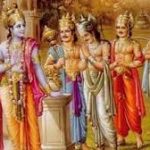The Mahabharata is an epic of enormous proportions—a hundred thousand verses, making it arguably the largest such poem in existence. It has traditionally been said to have been dictated by the sage Vyasa to his divine scribe, Ganesa, who wrote it all down using his single tusk as the stylus. It is currently divided into eighteen parts, with two important appendices: the Harivamsha and the Bhagavad Gita.
Although the epic may originally have been drawn from bardic material about warrior heroes, it was appropriated by an orthoprax Brahmanical tradition that was eventually dominated by the Bhargava priestly lineage. Even so, varied perspectives survive within its caste framework (varna-asrama- dharma). Although nested storytelling predominates, a simple account can be given of the basic events.
Two sons, Dhritarashthra and Pandu, were born to King Vicitarvirya. Dhri- tarashthra was the elder, but because he was born blind, he was disqualified to succeed Vicitarvirya. So Pandu became king and had five sons, the Pandavas. But shortly after their mysterious birth, he died. So Dhritarashthra came to the throne, which set up a problem of who would succeed him as king: his eldest son Duryodhana or Pandu’s eldest son Yudhishthira. His one hundred sons and the five Pandavas were raised, educated, and trained in the martial arts together. Duryodhana claimed succession and forced the Pandavas and their joint wife Draupadi into exile. But when Duryodhana took the throne, the Pandavas challenged his right. So to avoid war Dhritarashthra divided the kingdom. But Yud- hishthira lost their half in a gambling match, Draupadi was humiliated as Duryodhana’s son claimed even her clothes, and the Pandavas were forced into a twelve-year exile, plus a year of living incognito. The twelve years of forest adventures nested stories within stories, followed by more adventures in the year living incognito.
The Pandavas returned to claim their half of the kingdom in the fourteenth year, but all this privation was for naught. Duryodhana would not honor the agreement to return their kingdom. The great eighteen-day war began. Just before combat was actually joined comes the episode recounted in the Bhagavad Gita: Arjuna lamented fighting a war against so many of his friends and kin, and Krishna, his charioteer, answered that he must do his duty (dharma) and fight, but that he could avoid sin by renouncing the fruits of his actions (thus engaging in nishkama karma—desireless action).
The Pandavas actually did win the war, but the emotional toll was so great that Yudhishthira abdicated and left the kingdom to a young relative. He and his brothers, their wife, Draupadi, and a dog set out for heaven, which was reached by going north into the Himalayas. All died along the way, except Yudhishthira and his dog. When they finally reached heaven, the dog was refused entrance, and Yudhishthira would not go into heaven without him. The problem was solved when it was revealed that the dog was really Dharma-deva. Yudhishthira was shocked to find Duryodhana already in heaven and, worse, that he himself would have to be reborn to another lifetime on earth because of his attachments and lack of renunciation.

